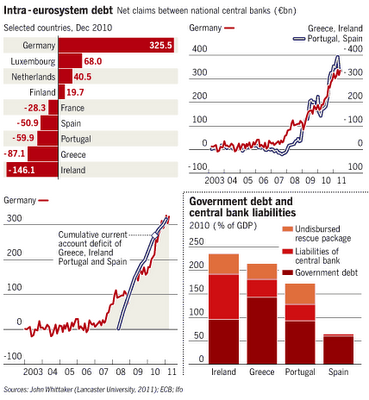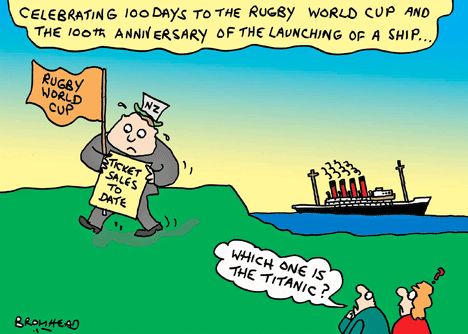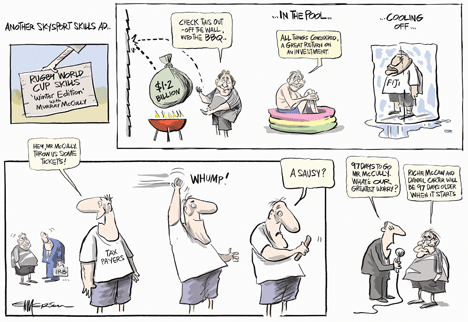
Here's my Top 10 links from around the Internet at 10 past 12 midnight in association with NZ Mint.
I'll pop the extras into the comment stream. See all previous Top 10s here.
I welcome your additions in the comments below or via email to bernard.hickey@interest.co.nz.
This is officially the earliest Top 10 ever and done in honour of the June quarter Monetary Policy Statement from the Reserve Bank of New Zealand. I know I'll never find time later today unless I do it real early. As Black Francis sings below: "Where is my mind!".
1. A sign of things to come - One of the biggest owners of oil super tankers reckons the market for supertankers is about to implode.
Rates for these super tankers are an indicator of both demand for oil globally and supply of such ships.
HT Chris via email.
Chairman John Fredriksen says the biggest crash in the cost of ships has yet to happen. It will be within “a year or two” that the market “collapses,” the 67-year- old said in an interview in Oslo last month. For Fredriksen, whose fortune was valued by Forbes magazine at $10.7 billion in March, that will be an opportunity to buy more vessels at a discount, he said. For other investors, it may mean that the more than doubling in freight rates predicted for next year by forward freight agreements, traded by brokers and used to bet on future shipping costs, is too optimistic.
The industry is contending with a glut of capacity as the fleet expands twice as fast as demand. Even as owners cut vessel speeds by an average of 11 percent in the past 12 months to save fuel and anchored 21 percent more ships, earnings slumped 81 percent. Rates on the Middle East-U.S. route have been negative since March, meaning owners are paying customers to use their ships, data from the Baltic Exchange in London show.
“We’ll wait until the market collapses and then we’ll buy up what’s there,” Fredriksen said May 25.
He cites the experience of an Irish Agentinan Patricia O'Shea, who returned to Argentina after it defaulted in 2001. HT Brendan via email.
She explained to me that, after the default and the devaluation, it made sense to invest in Argentina again because the country was competitive.
The money that had left the country before the default – because it expected a default – came back. The price of all assets fell dramatically, new money gushed into the country and the economy grew rapidly – it has grown in each of the last ten years since the default on 2001.
The point is that the default and devaluation of the currency didn’t cause the economy to get worse. It caused the economy to recover because people like O’Shea invested after the default, not before it. There is life after default; in fact there is vibrant life. If we walked away from the bank debts in Ireland – debts that are not ours to pay – but continued to pay our sovereign debt, basic economics tells you that the economy would be stronger, not weaker; the balance sheet more robust; money that had left the country would come flooding back.
Having watched the EU again deal with Greece last week by preaching the medicine of no real debt restructuring – more debt and more austerity – it seems the lessons of Argentina from 1998-2002 have been lost on everyone. We in Ireland are making exactly the same mistakes as the Argentinians made back then.
3. Close to average - This table below from Bruce Bartlett at NYTimes' Economix shows New Zealand's tax plus private healthcare costs are in line with the OECD average and only just above the US level. HT Donald via email.
4. Here's an idea - Andrew Patterson at Radio Live's Sunday Business interviewed Xero CEO Rod Drury and Auckland University Professor Greg Whittred about Peter Thiel's idea of paying young entreprenuers NOT to go to tertiary education.
Rod Drury doesn't like the idea. He says New Zealand is different from America where costs are outrageously high.
Drury is so positive. He's fantastic to listen to and is doing a wonderful job at Xero and so many other things.
5. Reseeding the economy - This piece from Harvard Business Review's Umair Haque is getting on a bit now, but still resonates with me.
He argues for a recapitalisation of the economy. And for 'forporations' rather than corporations.
Sounds a bit ...er...radical, but worth a read.
Instead of creating new value, too many corporations merely transfer value from society to shareholders (consider, for a moment, the paradox of skyrocketing corporate profits versus record long-term joblessness, obesity, or carbon emissions). The problem isn't, when you think about it, that corporations are dysfunctional. The problem is the very opposite: it's that maximizing near-term profit, no matter what, is exactly what the modern corporation was made to do — and is bound to do.
Rebuilding our base of organizational capital means reinventing our most heavily utilized kind of organization, the corporation, to do bigger, better, more enduring things. How might we do it? By creating private-public partnerships to seed and invest new kinds of corporations. Consider the groundswell of states passing legislation for B corporations, a new kind of corporation which balances shareholder value and social returns, instead of prioritizing one over the other. Authentic prosperity depends on what I sometimes call "forporations": more efficient, effective corporate forms "for" the pursuit of more meaningful, disruptive goals than just near-term financial gain; that exist "for" the benefit of more than just shareholders.
6. The joy of human flourishing - Here's Umair Haque again with something fresher at CSMonitor.
And a brand new word (for me at least): eudaemonia or human flourishing.
Here's what Haque is saying:
Instead of bigger, faster, cheaper, Americans need a more fulfilling, satisfying kind of prosperity. The ancient Greeks called it eudaemonia – 'flourishing' – which means the pursuit of fulfillment, inspiration, creation, and accomplishment.
America's bankrupt, but not in the way you think. Not merely financially, but at a deeper level, it's bankrupt in terms of its understanding of prosperity – what a "good life" is imagined to be.
Here's how I'd contrast eudaemonia with opulence. The pursuit of opulence is predicated on having more, bigger, faster, cheaper, now – about immediate pleasure through material possession. The pursuit of eudaemonia is a more nuanced, complex conception of a good life, that asks: "How does the way you work and live make you smarter, fitter, grittier, more empathic, wiser? What did you build today – and how did it help someone live, work, or play meaningfully better?"
7. Britain is next - Reuters reports that a Moody's analyst has warned that Britain may lose its AAA credit rating. The pound dropped as a result.
8. The Rage of the Indigants - Der Spiegel has an excellent feature here on how Europe's young are protesting at the economic malaise sweeping the continent.
Here's a sample.
"We, the unemployed, the underpaid and the interns, are the best educated generation in the country's history," they wrote. "We are protesting so that those responsible for our precarious situation quickly change this untenable reality."
Carvalho, 25, who studied international relations, is a polite young man with a beard and a leather armband on his wrist. He says that he is normally a patient person. But when he discovered that, despite having obtained a master's degree in English, he would likely only be able to get a limited contract and that he would likely be forced to find work in Africa, he was overcome with fury.
Carvalho says that a song by the band Deolinda inspired them to protest. The lyrics epitomized their feelings about life: "I'm from the generation that doesn't get paid. It doesn't bother me. How stupid can I be? Things are going poorly, and that's the way it will stay. Those who can land an internship are lucky. What a stupid world this is, a world in which we go to school to become slaves."
More than 44 percent of people under 25 have no work in Spain, and almost one in three young academics is unemployed. More than half of those young workers who are employed have so-called garbage contracts, which are often limited to just a few weeks. Even during the boom years, young people suffered from bad schools, expensive universities and a slim job market. Since the real estate bubble burst three years ago and the crisis erupted, young people, once again, are the ones suffering the most.
Ironically, a 93-year-old Frenchman provided the template for the youth protests. "Indignez-vous!" or "Be Outraged!" is the polemic pamphlet that the former French resistance fighter Stéphane Hessel published last year. The Spanish "indignados" and the French "indignées" have borrowed their names from Hessel's title.
9. Ireland seems wedded to the Euro - Irish economics professor Kevin O'Rourke points out the Irish politicians are Europhiles and are kowtowing to the European masters. HT Naked Capitalism.
10. Totally a video about the Weiner thing. I haven't touched it until now... here's Jon Stewart and John Oliver
And a bonus! Here's Kirsten Schaal talking about the Weiner story... She's the slightly creepy one that shadows one of the Conchords.
11. Totally a bonus music video with 14 minutes of pure Pixies genius. Joey Santiago does some wonderful things with his guitar around the 4 minute mark.
17 Comments
" Flourish " , Bernard ? ....... in lieu of work , innovation , and paying off our debts , we're going to " flourish " ! ...... ...
. Well I suppose it is official , NZ Treasury are taking into account the structural state of our " happiness framework ".
..... call Gummy an old fashioned dinosaur if you will , but I thought that inspired folk could find fulfillment in accomplishing the creation of a wonderful new service / business / product ........
So we're all gonna suck on our government provided entitlements , hold hands , and sing " kumbaya " ....... is that it ?
... Fecking Hacque ! ....... And eudaemonia to you too , pal , with opulent brass knobs on .
Hey It's Parky...where you been Parky...paid off that mortgage yet..did ya read that MO I sent ya..well did ya...if not go to MO (market Oracle) and enjoy the one on the money and the crooks and thieves in the kitchen...it's right up your creek Iain!...
I do wish BH would catch BE one time and ask him if he's happy with the current rate of debasement!...do please BH....it will be worth it to see him squirm.
The ducks are almost lined up on the fence ready for the shout...."FIRE"
You don't want to be buying no ducks until after the smoke clears ...no sireee
If I remember correctly the concept of corporations measuring social goals was discussed and very partially implimented,(Mid 1980s?) for some governemnt funded corporartions, but it would have caused a recession. We are simply not productive enough yet and we prefer material goals
Spirk
That's the nub of the problem. Too many people plus not enough resources equals you'll never be productive enough, ever.
Or, as J Paul Getty once opined: "there's no such dollar figure as 'enough' ".
But doubling-time comes into it now. NZ productivity has increased at 2% pa, since the late 70's. That sounds innocuous, but it's a doubling. The next doubling would require a four-fold increase on 1970's per-person-per-hour output. With a declining real energy supply.
So the morph will be triggered by something else. Probably austerity and lack of conventional options.
Im not sure what 3. is saying......for instance,
1) the US's cost is artifially lower as its health system doesnt account for not covering everyone and having a lower life expectancy....
2) Its tax take is hugely short and its healthcare costs twice ours...
3) The US's healthcare costs are on a trajectory to absorb 36% of GDP within a decade, that isnt sustainable...
So apart from a nice way to hide the US's healthcare cost problems and deficit problems what does it show?
"Bruce Bartlett held senior policy roles in the Reagan and George H.W. Bush administrations and served
on the staffs of Representatives Jack Kemp and Ron Paul."
"In other words, if we had a health care system like those in most developed countries, we could, in effect, give every American an increase in their disposable income of 8 percent of G.D.P. – about what they pay in federal income taxes – and have health care no worse than they have in Britain or Japan. It would be like abolishing the federal income tax in terms of allowing people to spend more of their income on something other than health care."
"In short, a substantial portion of the higher tax burden that Europeans pay is really illusory. They are really just paying their health insurance premiums through their taxes rather than through lower [net] wages, as we do."
ah someone who see's what I see....and the public health service is half the cost for everyone and has a better outcome....
regards
Windjammers....cool ships, that last of and at the limits of [sailing] technology...and to think to get these in the 1900~20s was the end result of 500~600 years of European deep sea sailing tech....not overnight....and steam ships took decades to surpass them in comparison....
Same with fossil fuels, its interesting when you then compare these real wolrd examples to what the ppl who dont read or understand engineering / science claim "that we can simply switch to something better" If you cant switch off fossil fuels and in this case you cannot, you reach the limit as did the windjammers.
Of another interesting thing power tools are still fairly expensive, hand tools now seem so cheap....yet use zero energy.....funny how you get used to the time and labour saved by a power saw / router in cutting a slot/groove....let alone the accuracy over by hand...(at least for me)
regards
I liked the Cartoon about sales of Rugby World cup tickets .
I did a quick survey in the office ( 11people) on who has purchased tickets , and almost everyone said "too Expensive ". Not one staffer or their spouse has bought any tickets. The staff all have some interest in Rugby .
Interestingly , no one was prepared to buy these using their Credit Cards.
http://www.investorsinsight.com/downloads/otb/mwo060611.pdf
John Mauldin link to a most excellent article by Michael Hudson.
Michael Hudson's analysis is brilliant and well worth taking time to understand. He explains how the banking system has distorted our society by favouring finance over production.
This is in essence why I eventually gave up manufacturing and job creation and turned to commercial real estate.- the world is organised against manufacturing and production. As my accountant put it - it was "time to move up the food chain".
This is deadly serious stuff and while I may rant and rave occasionally on this site it is fundamental to understanding the problems this country faces. It is not about us and them, it is about understanding the forces that shape our world and therefore what to do in response.
I don't tend to agree with Michael Hudson's precise recommendations but his analysis of the world economy into two sectors: production and consumption on the one hand, and finance and real estate on the other, is sheer brilliance.
Ive been reading this sort of line on Steve Keen's site for a while....
The argument is actually not one of the struggle between workers and capitalists/employers its one of workers&capitalists v finance....it is finance that cripples businesses, weakens governments and destroys jobs....and when banks make bigger and bigger profits in the good times and then carry on in the bad times you know you have to change things.
regards
#9 Kevin O'Rourke.
Nice interview - beautifully 'measured tone'. Hints of Olafur Ragnar Grimsson. "Speak softly and carry a big stick".Here's what the Chinese are up to in Southern Argentina
http://www.bloomberg.com/news/2011-06-08/beidahuang-will-invest-1-5-bil…
Heilongjian Beidahuang Nongken Group Co., China’s biggest farming company, plans to invest $1.5 billion to develop farms and expand a port in Argentina’s southern region to help ensure food supplies for 20 years.
The state-owned food producer and the government of Argentina’s Rio Negro province in Patagonia are working on an agreement to develop 300,000 hectares (741,000 acres) of land that are not being farmed, provincial economy development secretary Maximiliano Bruno said today at a press conference in Buenos Aires.
"are not being farmed"
code for 'virgin forest'.
I always knew it would get interesting (so to speak) when the exponential curve started to go vertical. They're securing any resource they can, short of a war they can't - yet - win.
Socialists
Don't we all (well nearly all) hate socialism?
Maybe.
Quick Poll
Do we want The Army, Police, Piped water, sewer systems? Roads(not even the building of the road but the fact that there is somewhere for the road to go),
At some point all of these things are socialist activities, however the entity that provides them is constructed they are provided becasue as a society we have agreed to their collective provision.
So what about those socialist then.
The ones that bailed out AMI and SCF and continued to bail out all the banks. The ones that have done all this arn't called socialists. If the market had been able to operate rich pickings would have been made by those ready to pounce. So why not let them. Why have the losses be socialised and the profits privatised?
Seems like they are socialists when it suits them, just not all the time.
I am really starting to dislike those socialists running NZ.
I like number 6 thanks Bernard.
"Nonetheless, the actual cuts expected of government departments over the next four years amounted to only 1% of total spending, in keeping with the government's political strategy of making "reasonably significant but not too scary decisions" on the way to its longer term goals" tvnz
If you are looking for the one thing that characterises the failure of this govt...look no further than that fact.....
They are too gutless to make the cuts to Sir Humphrey's palace of bloated salaries and endless perks....the bureaucrats are running the show....now you know why Kiwi are running away.
1%...what a fecken joke.
The cuts are certainly more than 1% of the budget for many government departments. Plus the ones where the budget allocation is unchanged have less than the previous year because of inflation plus population increases.
And I know my public servant salary is not (a) bloated -- I can get more elsewhere -- and (b) has been decreasing in real terms for the last three-four years.
And what are these additional perks I am supposed to have? Traditionally there was job security, although the tradeoff was lower pay. Now all I get is the lower pay and job insecurity.









We welcome your comments below. If you are not already registered, please register to comment
Remember we welcome robust, respectful and insightful debate. We don't welcome abusive or defamatory comments and will de-register those repeatedly making such comments. Our current comment policy is here.